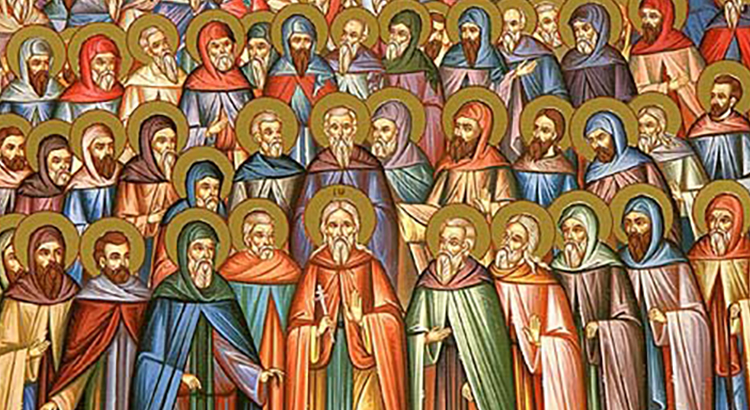Memory of the Saints and the Prophets
Prayer for the unity of Christians. Particular memory of the Protestant Churches and Ecclesial Communities (Lutheran, Reformed, Methodist, Baptist, Pentecostal, and Evangelical).
Reading of the Word of God
Alleluia, alleluia, alleluia
You are a chosen race,
a royal priesthood, a holy nation,
a people acquired by God
to proclaim his marvellous works.
Alleluia, alleluia, alleluia
1 Samuel 17,32-33.37.40-51
David said to Saul, 'Let no one be discouraged on his account; your servant will go and fight this Philistine.' Saul said to David, 'You cannot go and fight the Philistine; you are only a boy and he has been a warrior since his youth.' 'Yahweh,' David went on, 'who delivered me from the claws of lion and bear, will deliver me from the clutches of this Philistine.' Then Saul said to David, 'Go, and Yahweh be with you!' He took his stick in his hand, selected five smooth stones from the river bed and put them in his shepherd's bag, in his pouch; then, sling in hand, he walked towards the Philistine. The Philistine, preceded by his shield-bearer, came nearer and nearer to David. When the Philistine looked David up and down, what he saw filled him with scorn, because David was only a lad, with ruddy cheeks and an attractive appearance. The Philistine said to David, 'Am I a dog for you to come after me with sticks?' And the Philistine cursed David by his gods. The Philistine said to David, 'Come over here and I will give your flesh to the birds of the air and the wild beasts!' David retorted to the Philistine, 'You come to me with sword, spear and scimitar, but I come to you in the name of Yahweh Sabaoth, God of the armies of Israel, whom you have challenged. Today, Yahweh will deliver you into my hand; I shall kill you, I shall cut off your head; today, I shall give your corpse and the corpses of the Philistine army to the birds of the air and the wild beasts, so that the whole world may know that there is a God in Israel, and this whole assembly know that Yahweh does not give victory by means of sword and spear -- for Yahweh is lord of the battle and he will deliver you into our power.' No sooner had the Philistine started forward to confront David than David darted out of the lines and ran to meet the Philistine. Putting his hand in his bag, he took out a stone, slung it and struck the Philistine on the forehead; the stone penetrated his forehead and he fell face downwards on the ground. Thus David triumphed over the Philistine with a sling and a stone; he hit the Philistine and killed him, though he had no sword in his hand. David ran and stood over the Philistine, seized his sword, pulled it from the scabbard, despatched him and cut off his head. When the Philistines saw that their champion was dead, they fled.
Alleluia, alleluia, alleluia
You will be holy,
because I am holy, thus says the Lord.
Alleluia, alleluia, alleluia
Saul is unable to defend Israel from the Philistines. Goliath is the incarnation of the Philistine's threat against Israel. He is not only a giant metaphorically speaking; he truly has a very imposing figure whose physical appearance provokes waves of fear throughout Israel. Furthermore, he is fully armoured: he has a helmet, chainmail, greaves, a javelin and a spear. He is the archetypal warrior. Along with his terrible armour, speaking pretentious words, he carries himself with unshakeable confidence. Israel is intimidated by him. But then here is David, the eighth son of a distant family who comes along without attracting any attention. David is very eager to see battle. Everyone else is terrified, unable to think or speak. David, however, questions with confidence why the Philistine dares to defy the armies of the living God (v. 26). David knows that the Lord watches over Israel. For him, it is unthinkable to enter battle without God. He is truly "after God's heart" (13:14). His question, which seems naïve, actually is a clear rebuke of his brothers and of Saul. David knows that the Lord is with his people. David goes straight to Saul and speaks to him of his experience and qualifications (16:18). He tells how he protected his flock from "lion and bears," saving them from the animals that assaulted them (v. 35). Therefore, he would treat that Philistine like one of those predators that he had killed without fear. The strongest motivation for David's courage is that the Philistine had dared to defy the "living God." In this passage, no one else but David mentions God. He has no doubt in God's help. Saul is convinced and responds to David also with the courage to speak of God. It is as if David gave Saul the courage and faith to speak of the Lord once again. Saul wants David to imitate him and wear the armour of war. But David refuses to be like Saul, like the other nations, or like the Philistine (v. 39b), and proposes a radical alternative: only five smooth stones (v. 40). And now they are in a face-off: military strength on the one side, weakness on the other; the giant and the boy; the one who trusts in himself and the other who trusts in God. David gives witness to God's strength, turning to the giant to say, "This very day the Lord will deliver you into my hand" (v. 46). David defeats the giant with a single stone. He knocks him down and cuts off his head.
